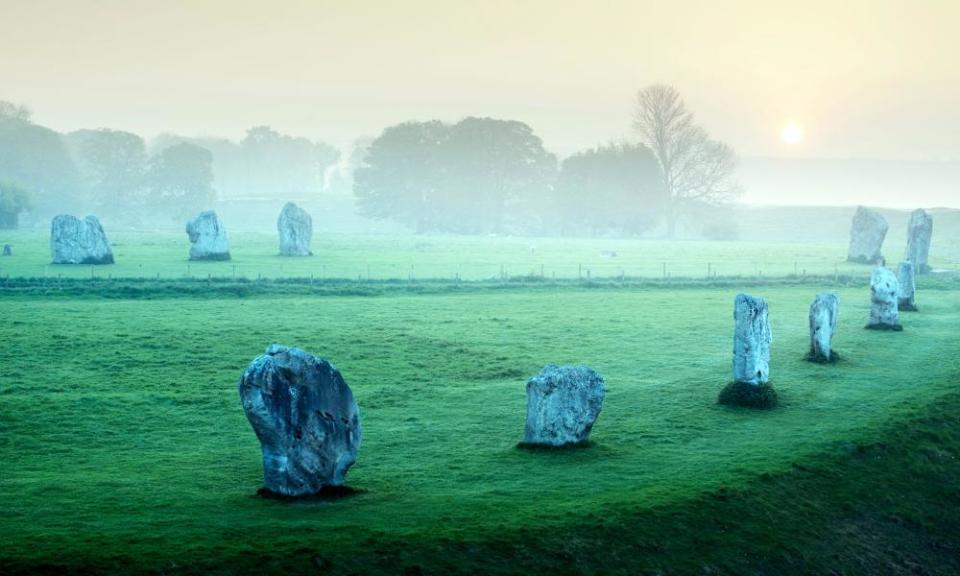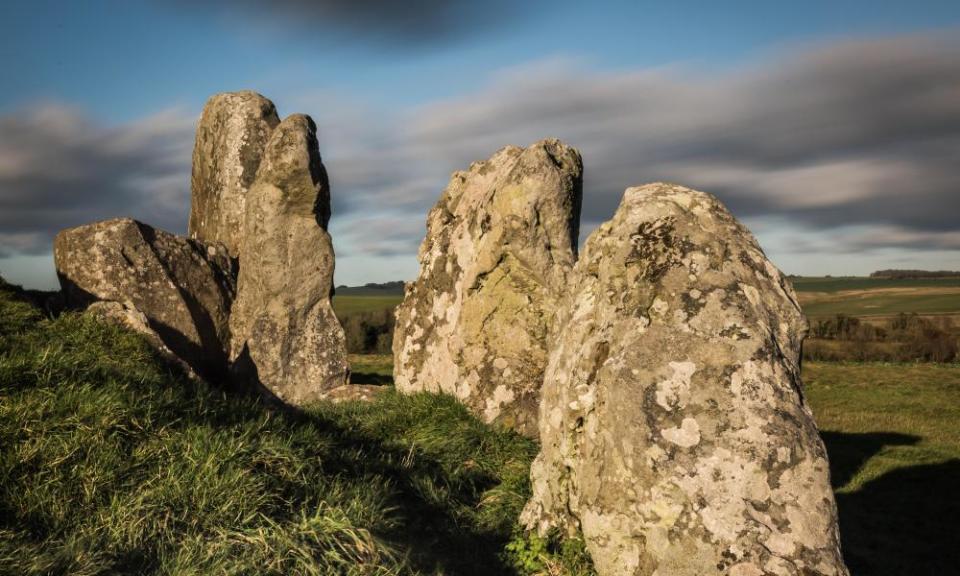Stone circles, silence and sanctuary: finding yourself on an Avebury pilgrimage

‘Both festivals mark the beginning of spring,” Dr Guy Hayward, co-founder of the British Pilgrimage Trust, booms across East Kennett’s village church, a couple of miles from Avebury. It’s a welcome thought and apt, given that despite the bitter wind and squally sky, snowdrops and daffodils are peeking out of the sodden ground outside.
Two days shy of the festivals of Imbolc and Candlemas (1 and 2 February), Guy is explaining their significance. Celtic Imbolc is a celebration of fecundity and new beginnings (it translates as ewe’s milk); Christianity morphed it into Candlemas – which celebrates the coming of light. Battling with lingering winter lethargy, I’ll take either.
I’m not the only one. Twenty-five of us – different nationalities and ages – have come to Avebury, Wiltshire, for a nine-mile pilgrimage organised by the British Pilgrimage Trust. Founded in 2014, the charity is restoring England’s ancient pilgrimage ways and hopes to make holy places more accessible. There are 110 routes in its online directory but its flagship project is the re-creation of the 250-mile Old Way from Southampton to Canterbury. Other 2020 initiatives include opening the doors of some Old Way churches for pilgrims to stay overnight, and one-day pilgrimage routes to more than 45 cathedrals in England and Wales – several taking in mosques and synagogues.
The trust operates a bring-your-own-beliefs ethos. I’m not sure I have any beliefs to bring but within minutes I’m swept up in the mix of folklore, songs and rituals.
Guy is accompanied by two guides. Softly spoken ritual-maker Charlotte Pulver helps us celebrate water and Imbolc’s patron, St Brigid (also known as Brighid, Bride, Brigit) along the trail, with blessings and poetry. Chris Park, druid, beekeeper and expert on ancient Avebury, unravels the landscape’s folklore. Dressed head to toe in tweed and wool, with wild curly hair and a homemade wicker “bride” (a small woven cross, pronounced “bridey”) over his shoulder, Chris certainly looks the part.
The set-up is refreshingly free of the pseudo-spirituality so many wellness concepts exude. The guides bring knowledge and perspective on everything from the choral tradition to bronze-age settlements and the development of language.
From East Kennett, we meander up to the Sanctuary, where ley lines, old paths and the Ridgeway intersect. A collection of concrete posts mark the original concentric stone circles that date back to 3000BC. Chris says: “From here we will walk through Avebury’s landscape following our ancestors’ footsteps, weaving between prehistoric landmarks.” There’s something humbling about following a snaking and illogical ancient trail.
Huddled at the core of the Sanctuary, bracing against slashing rain, Guy asks us to remember our intentions in silence, while Chris doses the land with a bottle of homemade metheglin (mead with herbs). Before joining the pilgrimage, we each had to bring an intention – asking for help or giving thanks. I ask for help shaking off winter’s malaise to find joy in the everyday; little did I know there was a festival to help me do just that.
From the Sanctuary we trudge over stiles and across fields caked in sticky mud. Guy explains that it’s the intention that separates a pilgrimage from a walk, “By calling your walk a pilgrimage and giving it intention, you walk with greater awareness.” The aim is to create a more profound respect and love for nature and our heritage. “It’s a way to give back to the land; it’s a two-way relationship”.
The rain is easing off by the time we approach West Kennet Long Barrow, one of the longest and oldest in Britain – constructed 400 years before work on Stonehenge began. We pay respect to the sarsen stones that guard the entrance, leaning on them with hands or foreheads, before entering the darkness. Squeezed in, Guy starts an overtone chant: the low-level hum is contagious and soon the barrow is alive with a choral buzz.
Our next stop is Swallow Head Spring, in the corner of a ploughed field. Charlotte invites us to “touch and play with the water” as Guy sings a song revering springs and water as the source of all life. What seemed nondescript at first soon feels like an idyllic nook. The spring bubbles up under a gnarly willow trunk before joining the River Kennet – a much-needed wildlife corridor meandering through otherwise cultivated land.

Lunch calls and we skirt around Silbury Hill’s 40-metre-high “pregnant belly” to picnic at the centre of Avebury’s complex. Surrounded by the day’s landmarks, we chant St Brigid’s many names but move on quickly to keep warm. Within moments, just as the sun tries to break through drifting cloud, we step into the West Kennet Avenue: around 100 pairs of prehistoric stones that ascend towards Avebury.
At Avebury, we circle the henge, taking in the landscape. Guy reminds us that this is not only the world’s largest stone circle but also the most revered: for more than 5,000 years people of all faiths have felt a connection to this land. We marvel at how tactile the stones are, following contours of crevasses and lichen. Those that know Avebury remark how different it feels to walking to it, rather than joining the “touristy circus”.
We arrive at our destination as the sun sets and the fire-like sky flickers across the Wiltshire hills. Despite tired legs and disappearing light, there’s a sense of contented excitement. Chris says: “The Windmill Hill burial ground is the first part of the Avebury complex, so we’re ending at the beginning.”
As dusk falls, we lie in silence on the mound; themes of nature, respect, ancestors and heritage whirl through my mind. Eventually, I let go, remember my intention, and one thought floats to the top:gratitude for being at Windmill Hill with fellow pilgrims at my favourite time of the day.
• British Pilgrimage Trust events cost from £50pp. Its next walk will be from Glastonbury to Wells Cathedral in March. Accommodation was provided by The Old Forge B&B (doubles from £90 B&B) in East Kennett
Looking for a holiday with a difference? Browse Guardian Holidays to see a range of fantastic trips

